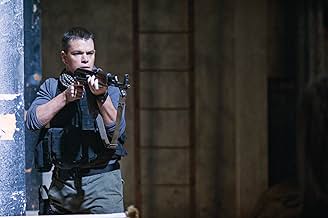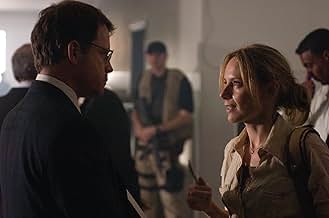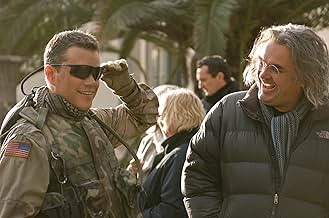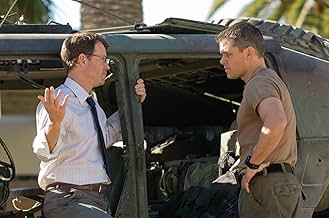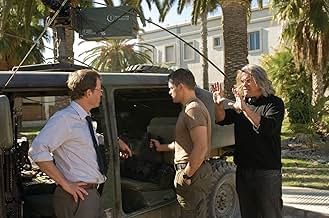Green Zone
- 2010
- Tous publics
- 1h 55min
NOTE IMDb
6,8/10
146 k
MA NOTE
La découverte d'informations secrètes et de renseignements erronés pousse un officier de l'armée américaine à se mettre à la recherche d'armes de destruction massive dans une région instable... Tout lireLa découverte d'informations secrètes et de renseignements erronés pousse un officier de l'armée américaine à se mettre à la recherche d'armes de destruction massive dans une région instable.La découverte d'informations secrètes et de renseignements erronés pousse un officier de l'armée américaine à se mettre à la recherche d'armes de destruction massive dans une région instable.
- Réalisation
- Scénario
- Casting principal
- Récompenses
- 6 nominations au total
Faycal Attougui
- Al Rawi Bodyguard
- (as Faical Attougui)
Michael J. Dwyer
- Met-D
- (as Michael Dwyer)
Avis à la une
I saw trailers for this movie on t.v (in Australia)...it seemed to be an action hero type movie...I actually wondered if this was the new "Bourne" movie for Matt Damon! Perhaps this promotional approach was due to a recent run of movies critical of the US in the current Iraq war being box-office misses. Anyway, I was prepared to watch the movie based on the trailers, but had second thoughts when the nature of the movie was mentioned on a movie review show on TV here in Australia. That nature concerned the movie venturing into the rationale of the US invasion of Iraq in 2003.
So, taking a punt, I saw the movie armed with this new information. It's actually good...not depressing like movies with this type of theme can be. Not sure how much reality there is to it...it seems to cover the bases on the reasons given as to why the US invaded Iraq and the underlying reality on the ground.
What's particularly interesting is how the Pentagon and the C.I.A. are depicted. No doubt there are numerous American movies where both organisations are depicted as suspect or evil. Here, one organisation comes off as acting in good faith and acting morally. Don't know enough about the war to say for certain if any US organisation can claim to have acted ethically, but this dichotomy is illuminating for the factoids it throws at the audience.
If the movie does have a lot factual truth to it, then some of the events in it are truly disturbing...e.g. how the U.S. deals with people who may be able to disprove the official government line on the reasons for the war. Maybe this is just artistic license, or perhaps it's real politic as far as the U.S. goes...and anyone who has read Noam Chomsky knows that the U.S. goes all the way.
I'm reminded of General Colin Powell's hand-on-the-heart moment in the U.N. where he showed satellite photos of vehicles and swore that these were mobile weapons of mass destruction delivery vehicles. Turns out that they were milk trucks...like the Iraqis said they were. It's this 'evidence' which convinced a reluctant U.N. to take the US' assertions as true and to authorise the invasion of Iraq. This movie's trailer is like General Colin Powell's moment of infamy...the trailer bears no relation to what you actually see. But it's more compelling than what the general's photo turned out to be.
Matt Damon (as Chief Warrant Officer Roy Miller) makes for a good lantern-jaw type hero...if such a figure actually exists, you'd think they would have have been run out of the ranks for not towing the official line. Anyway, the movie is about Miller's role in finding those elusive weapons of mass destruction that President Bush assured us were there. When he doesn't have much luck finding them, he wants to find out why...
So, taking a punt, I saw the movie armed with this new information. It's actually good...not depressing like movies with this type of theme can be. Not sure how much reality there is to it...it seems to cover the bases on the reasons given as to why the US invaded Iraq and the underlying reality on the ground.
What's particularly interesting is how the Pentagon and the C.I.A. are depicted. No doubt there are numerous American movies where both organisations are depicted as suspect or evil. Here, one organisation comes off as acting in good faith and acting morally. Don't know enough about the war to say for certain if any US organisation can claim to have acted ethically, but this dichotomy is illuminating for the factoids it throws at the audience.
If the movie does have a lot factual truth to it, then some of the events in it are truly disturbing...e.g. how the U.S. deals with people who may be able to disprove the official government line on the reasons for the war. Maybe this is just artistic license, or perhaps it's real politic as far as the U.S. goes...and anyone who has read Noam Chomsky knows that the U.S. goes all the way.
I'm reminded of General Colin Powell's hand-on-the-heart moment in the U.N. where he showed satellite photos of vehicles and swore that these were mobile weapons of mass destruction delivery vehicles. Turns out that they were milk trucks...like the Iraqis said they were. It's this 'evidence' which convinced a reluctant U.N. to take the US' assertions as true and to authorise the invasion of Iraq. This movie's trailer is like General Colin Powell's moment of infamy...the trailer bears no relation to what you actually see. But it's more compelling than what the general's photo turned out to be.
Matt Damon (as Chief Warrant Officer Roy Miller) makes for a good lantern-jaw type hero...if such a figure actually exists, you'd think they would have have been run out of the ranks for not towing the official line. Anyway, the movie is about Miller's role in finding those elusive weapons of mass destruction that President Bush assured us were there. When he doesn't have much luck finding them, he wants to find out why...
The Green Zone is that rarest of films—a well-written, rousing action thriller with a political conscience that perceptively deconstructs the idiocy of war. From the very first scene, the action grabs you and throttles you for the ensuing two hours—although the story is fairly complex, the exposition is handled deftly, and—despite the constantly jolting camera work—it's pretty easy to follow along with what's happening. Matt Damon delivers a strong performance as an Army Warrant Officer who truly cares about the justifications for his actions—he has no problem being a good soldier, as long as he knows that there are clear moral reasons behind what he's been ordered to do. Unfortunately, during the early days of the Iraq War, clear moral reasons were in very short supply, and Damon's character battles an array of competing military and political agendas as he searches for the truth behind the military's search for the ever-elusive Weapons of Mass Destruction rumored to be hidden in Iraq. This film is so well done, and Damon is so good in it, that I'm starting to consider the Greengrass/Damon tandem on a par with the Scorsese/DeNiro and Scorsese/DiCaprio pairings. Damon's best work (the last two Bourne films and this one) has come with Greengrass at the helm—here's to hoping they make many more fine films together.
The new offering from Paul Greengrass is an intriguing progression from his previous films. Marrying the political engagement of films such as 'Bloody Sunday' with the blockbuster attraction of the Bourne films, 'Green Zone' was always going to promise attractive viewing, and it doesn't disappoint.
Matt Damon's character, Chief Warrant Officer Roy Miller, is in charge of an American Armed Forces unit in search of Weapons of Mass Destruction during the early stages of the Iraq conflict. When their search proves fruitless, Miller begins to question the supposedly 'solid' intelligence that gave the locations of these WMD sites. The plot follows Miller's demand for answers from an unstable command desperate to hide them, revealing a political division at the heart of the U.S administration.
Yes, this is fiction, but Greengrass has become adept at tapping into our taste for conspiracy, contextualising his stories within a political reality that has become all too familiar to us since the invasion began in 2003. It's thrilling stuff, and I think that is the key word to remember when watching this film. Thriller. Yes, there is political content here, and yes, it does hold up to some scrutiny. For example, the opening of the movie portrays the sense of confusion of conflicting command structures particularly well, really getting into the disorientation and intrigue of a military operation that isn't going as planned. The role of journalist Laurie Dayne (played by Amy Ryan) also provides a well-executed analysis of how the media's coverage of the facts can be impaired by the manoeuvrings of political and military authority.
There are moments when this political engagement appears heavy-handed, but that is because the director's priority is always, first and foremost, entertainment. For example, there is nothing subtle about Damon's character walking into a scene of Americans drinking and lounging by the pool of one of Saddam Hussein's palaces. Furthermore, the film suffers from conventional Hollywood stereotypes when it tries to depict the 'downtrodden-yet-hopeful' Iraqi citizen, who works with Miller in order to expose the truth about his country. Khalid Abdalla (best known for his lead role in 'The Kite Runner') does his best with the material available, but the role lacks depth and complexity, and for me is one of the few disappointments of the film.
But, as I said, this a work of fiction, and there are plenty of moments where our taste for excitement and spectacle is satisfied. Greengrass' now familiar 'handycam' filming style is appropriate to the sense that we are never sure as an audience where the threat is going to come from. It provides a kick of adrenaline to the action sequences, making us feel the sand in our mouths as we are thrown to the floor, and adds docudrama realism to the events on screen. Some of the reviews I have seen complained about this style of cinematography, but I think Greengrass has managed to make the technique contribute to the content of his film, rather than becoming overly intrusive or threatening our cinematic experience.
There is a delicious feeling of melodrama to the piece as a whole – the moustached Jason Isaacs as the sinister Special Forces operative provides a gripping counterbalance to the inquiring Matt Damon. Brendan Gleeson is superb as the CIA agent that won't roll over and accept the demands of the military and political commanders. Indeed, the cast as a whole appears to work well together in a film that successfully marries the need for political engagement with the desire for cinematic spectacle. It is a film designed for box office appeal, and yet despite this it doesn't compromise on the political foundations on which it is based. Its climax is a fine reward for the audience's suspense – in short, a well-worked film that cuts to the heart of our craving for conspiracy and revelation.
James Gill (Twitter @jg8608)
Matt Damon's character, Chief Warrant Officer Roy Miller, is in charge of an American Armed Forces unit in search of Weapons of Mass Destruction during the early stages of the Iraq conflict. When their search proves fruitless, Miller begins to question the supposedly 'solid' intelligence that gave the locations of these WMD sites. The plot follows Miller's demand for answers from an unstable command desperate to hide them, revealing a political division at the heart of the U.S administration.
Yes, this is fiction, but Greengrass has become adept at tapping into our taste for conspiracy, contextualising his stories within a political reality that has become all too familiar to us since the invasion began in 2003. It's thrilling stuff, and I think that is the key word to remember when watching this film. Thriller. Yes, there is political content here, and yes, it does hold up to some scrutiny. For example, the opening of the movie portrays the sense of confusion of conflicting command structures particularly well, really getting into the disorientation and intrigue of a military operation that isn't going as planned. The role of journalist Laurie Dayne (played by Amy Ryan) also provides a well-executed analysis of how the media's coverage of the facts can be impaired by the manoeuvrings of political and military authority.
There are moments when this political engagement appears heavy-handed, but that is because the director's priority is always, first and foremost, entertainment. For example, there is nothing subtle about Damon's character walking into a scene of Americans drinking and lounging by the pool of one of Saddam Hussein's palaces. Furthermore, the film suffers from conventional Hollywood stereotypes when it tries to depict the 'downtrodden-yet-hopeful' Iraqi citizen, who works with Miller in order to expose the truth about his country. Khalid Abdalla (best known for his lead role in 'The Kite Runner') does his best with the material available, but the role lacks depth and complexity, and for me is one of the few disappointments of the film.
But, as I said, this a work of fiction, and there are plenty of moments where our taste for excitement and spectacle is satisfied. Greengrass' now familiar 'handycam' filming style is appropriate to the sense that we are never sure as an audience where the threat is going to come from. It provides a kick of adrenaline to the action sequences, making us feel the sand in our mouths as we are thrown to the floor, and adds docudrama realism to the events on screen. Some of the reviews I have seen complained about this style of cinematography, but I think Greengrass has managed to make the technique contribute to the content of his film, rather than becoming overly intrusive or threatening our cinematic experience.
There is a delicious feeling of melodrama to the piece as a whole – the moustached Jason Isaacs as the sinister Special Forces operative provides a gripping counterbalance to the inquiring Matt Damon. Brendan Gleeson is superb as the CIA agent that won't roll over and accept the demands of the military and political commanders. Indeed, the cast as a whole appears to work well together in a film that successfully marries the need for political engagement with the desire for cinematic spectacle. It is a film designed for box office appeal, and yet despite this it doesn't compromise on the political foundations on which it is based. Its climax is a fine reward for the audience's suspense – in short, a well-worked film that cuts to the heart of our craving for conspiracy and revelation.
James Gill (Twitter @jg8608)
Green Zone is the latest Iraq War inspired motion picture. I wasn't expecting much and ended up being pleasantly surprised. It's a fast paced and riveting ride from the get-go. The war being fought in the film is more between the Pentagon and the CIA than the US v Iraq which makes it all the more interesting and the film allows you to see things from Iraq's perspective for a change. The premise set up in the film regarding the 'Intelligence' regarding Weapons of Mass Destruction used to justify the invasion is entirely believable. Matt Damon is well suited to his part as a unit leader Roy Miller, as is Brendan Gleeson as the CIA man and Greg Kinnear is refreshingly nasty as Poundstone from the Pentagon - all turn in good performances. Shot on location in Morocco, Spain and in England I could have sworn we were in Bagdad the whole time - settings are very convincing. Yes, there is too much hand- held camera movement that quickly brought on discomfort followed by a headache but that is my only negative and as the film doesn't outstay its welcome I'm willing to concede the shakiness probably lends an 'embedded' realism. Is any of the plot or characters based on real events or people? I have no idea other than learning the film is based on the 2006 non-fiction book 'Imperial Life in the Emerald City' by Rajiv Chandrasekaran, a journalist for The Washington Post. I haven't read the book so I can't comment on how closely the film follows it. I spent a few moments of the film wondering about the story's authenticity but as a piece of cinema entertainment in its own right Green Zone gets the green light from me.
This movie is not a sequel to Bourne flicks. It is more in the spirit of Costa-Gravas or Oliver Stone. MET Alpha is Mobile Exploitation Team Alpha. The 85th XTF is the 75th Exploitation Task Force. CWO Miller is CWO Gonzalez. The reporter is, of course, Judith Miller, the New York Times (not WSJ) reporter who sold out to the Bush administration to get bylines. She used her position as shill for Rummy to keep MET Alpha in Baghdad, chasing their tails while American soldiers died trying to find non-existent WMD, for the sole purpose of backing up Bush's lies. Miller's folio is full of information from Curveball (Magellan). The CIA, who knew Curveball was a liar, was also warning Miller. A perpetually smiling Ahmad Chalabi keeps popping up. He is no doubt thinking how fine it is for the US Army to hand him an entire country along with a treasury of several hundred million dollars.
Miller is angry because he knows his intelligence is bogus, the CIA has told him that much, even though the Army vouches for it, and tells Miller to shut up and follow orders.
The Pentagon puke tries to bribe Miller with a job if he plays along, and offers a veiled threat if he doesn't.
The movie is history, and not a simple action adventure flick. It follows actual events very closely. Knowing the facts makes the movie much more fascinating.
Miller is angry because he knows his intelligence is bogus, the CIA has told him that much, even though the Army vouches for it, and tells Miller to shut up and follow orders.
The Pentagon puke tries to bribe Miller with a job if he plays along, and offers a veiled threat if he doesn't.
The movie is history, and not a simple action adventure flick. It follows actual events very closely. Knowing the facts makes the movie much more fascinating.
Le saviez-vous
- AnecdotesMany of the soldiers in Matt Damon's WMD unit were actual Iraq War and Afghanistan War veterans, not actors. Damon said his biggest challenge was knowing he was an actor who was giving orders to actual soldiers.
- GaffesLike most films situated in the Middle-East this movie was filmed in Morocco. The streets are filled with French cars that you would not find in Iraq and scenes of men in crowds wearing the Moroccan common dress.
- Bandes originalesAboun Salehoun
Written by Youssef El Mejjad, Pat Jabbar
Performed by Amira Saqati
Courtesy of Barraka El Farnatshi Prod.
Meilleurs choix
Connectez-vous pour évaluer et suivre la liste de favoris afin de recevoir des recommandations personnalisées
Détails
- Date de sortie
- Pays d’origine
- Sites officiels
- Langues
- Aussi connu sous le nom de
- La ciudad de las tormentas
- Lieux de tournage
- Academia General del Aire, San Javier, Murcia, Espagne(Iraq exteriors)
- Sociétés de production
- Voir plus de crédits d'entreprise sur IMDbPro
Box-office
- Budget
- 100 000 000 $US (estimé)
- Montant brut aux États-Unis et au Canada
- 35 053 660 $US
- Week-end de sortie aux États-Unis et au Canada
- 14 309 295 $US
- 14 mars 2010
- Montant brut mondial
- 113 377 594 $US
- Durée1 heure 55 minutes
- Couleur
- Mixage
- Rapport de forme
- 2.35 : 1
Contribuer à cette page
Suggérer une modification ou ajouter du contenu manquant








